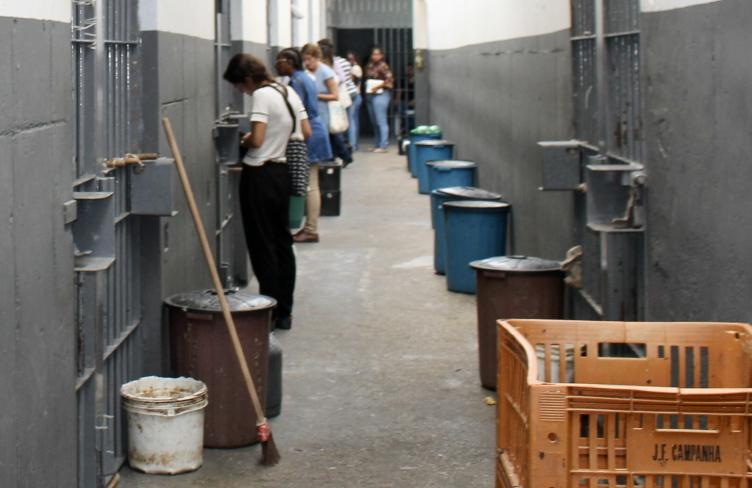
The recent adoption by the National Council of Justice (CNJ) of Brazil of guidelines on the treatment of persons with mental health conditions and psychosocial disabilities in situations of deprivation of liberty, through the publication of the CNJ Resolution No 487/23, paves the way for an important step in the implementation of psychiatric reform in the country. It presents an opportunity to genuinely uphold the principle of non-discrimination of persons with mental disorders and psychosocial disabilities deprived of liberty in the penitentiary system.
Adopted in 2001, the Psychiatric Reform Law – No. 10.216 – represented a shift in perspective in the field of mental health care in Brazil, transforming the guiding principles for the treatment of people with psychosocial disabilities and the allocation of public facilities for their health care.
The framework of Law No. 10.216/01 puts a check on the uncritical and routine use of psychiatric hospitals, replacing this with the provision of more humane treatment, in a therapeutic environment, using the least invasive means possible.[1] It establishes that persons should be treated, preferably, in community mental health services within their social environment [2] and have "access to the best treatment in the health system, consistent with their needs”.[3] Under the legislation, only in exceptional circumstances and on a temporary basis, should patients be kept in hospital, and hospitalisation in institutions with asylum characteristics should be prohibited.[4] Even in cases of hospitalisation, the treatment should be directed towards the social reintegration of the patient into his/her environment.
The Psychiatric Reform Law sought solutions to overcome a historical context in which psychiatric patients were sent to long-term nursing homes, which became known for the experiences of abandonment, violence and stigmatisation of those who lived within their walls. The Optional Protocol to the Convention against Torture and Other Cruel, Inhuman or Degrading Treatment or Punishment (OPCAT) [5], which came into force in 2006, includes a focus on nursing homes. Article 4.2 of the OPCAT defines the detention of patients in clinics, hospitals and similar institutions as a deprivation of liberty measure, since persons who are held in such "detention or imprisonment centres" by virtue of a judicial, administrative or other order are not permitted to leave of their own accord.
In 2008, it was the turn of the Organisation of American States (OAS) to adopt guidelines on this issue, through the Principles and Good Practices for the Protection of Persons Deprived of Liberty in the Americas. The document corroborates the concern regarding persons deprived of liberty, indicating that custodial measures should be applied for the shortest possible time and limited to strictly exceptional cases.[6] More specifically, with regard to "special measures for persons with mental disabilities", Principle 3 stresses the need to achieve the gradual deinstitutionalisation of these persons, promoting the "organisation of alternative services that make it possible to achieve objectives compatible with a comprehensive, continuous, preventive, participatory and community-based psychiatric care and health system, thus avoiding unnecessary deprivation of liberty in hospital or other establishments".
The model proposed by Law No. 10.216/01 was resisted by some sectors of Brazilian society. Nevertheless, over the last 20 years, the State has gradually adopted the anti-asylum principles it sets out, allowing psychiatric reform to become a public management tool in the field of health and to serve as the basis for establishing a broad and complementary Psychosocial Care Network (Raps), despite the inherent weaknesses of public services in the country.
The paradigm shift has allowed Brazil to align itself with the principles that underpin international human rights norms, although the reality for people with psychosocial disabilities in clinics, therapeutic communities, hospitals, prisons and custody hospitals continues to be the subject of concern, as expressed by international experts and bodies including the UN Special Rapporteur against Torture [7], the UN Subcommittee on Prevention of Torture [8] and the Inter-American Court of Human Rights. [9]
The UN Convention on the Rights of Persons with Disabilities [10] is cross-cutting in addressing this context of historical rights violations and discrimination, bringing a new focus to recognise persons with psychosocial disabilities as full subjects of rights, rather than "objects" of treatment. The Convention emphasises the prohibition of torture and ill-treatment against persons with disabilities [11], prohibits deprivation of liberty based on disability [12], and enshrines the right of persons with disabilities to live independently in the community. [13] [14].
In implementing Law No. 10.216/01, certain precepts have gradually been incorporated into processes of Brazil’s criminal justice system. Ordinance No. 94/2014 of the Ministry of Health, for example, provides that people with psychosocial disabilities in conflict with the law should be assisted within the scope of the National Health Care System (SUS), establishing the service of evaluation and monitoring of therapeutic measures.
In 2010, the body responsible for improving criminal policy, the National Council for Penal Penitentiary Policies (CNPCP), recommended the adoption of the anti-asylum policy in the care of judicial patients and under execution of security measure, as provided in Article 1 of CNPCP Resolution No. 4/2010. In its article 6, the Resolution calls on the executive government to conclude within 10 years, in partnership with the judiciary, "the replacement of the asylum model of compliance with security measure for the anti-asylum model, using the specific programme of attention to the judicial patient".
Thirteen years later, we see the judiciary taking a significant step in the direction of the CNPCP resolutions, Law No. 10.216/01 and international law on the issue. CNJ Resolution No. 487/2023 consolidates the psychiatric reform path within the criminal justice system, whose implementation was still lagging and not in full compliance with the documents set out above.
By outlining the anti-asylum policy of the judiciary, the CNJ supports the prohibition of long-term asylum for people with mental disorders or any form of psychosocial disability in conflict with the law, establishing instruments for the judicial authority to support and enforce its decisions, in line with the mental health treatment approach adopted by SUS and its Raps. At the same time, it provides for the gradual closure of asylums that still exist within prison administration departments, such as HCTPs.
The judicial guidelines for judges to ensure that people with mental disorders in conflict with the law are not kept in wards and isolation areas of prison units, or subjected to hospitalisation in institutions such as HCTPs, represents a clear step towards upholding the principles that underpin Brazil´s Psychiatric Reform. They strengthen support for those patients who are in a heightened situation of vulnerability and at risk of experiencing torture or ill-treatment.
Among its suggested procedures, Resolution No. 487/2023 is correct, for example, in recommending the judicial assessment of the adequacy of the prison in view of the need for health care, ensuring the rule of law, consultation with a multidisciplinary team and enabling the imprisoned person to access the Raps available through the public health care system. [15] By restricting the imposition of a security measure or provisional hospitalisation to absolutely exceptional cases, and subject to assessment by a health team; by linking such hospitalisation to a mental health bed in a General Hospital or other health equipment available in the National Health Care System; and by requiring the review every six months of judicial proceedings relating to people with mental disorders or psychosocial disabilities, Resolution No. 487/2023 strengthens and fulfils the objective of deinstitutionalisation.
The CNJ's guidelines succeed in addressing significant gaps identified over two decades following the adoption of the Psychiatric Reform in the country. CNJ Resolution No. 487/23 gives effect to the provisions of domestic legislation and international treaties, offering concrete direction to the judiciary so magistrates can comply with the right of persons with mental disorders or psychosocial disabilities to obtain non-discriminatory health treatment from the national public health care system throughout the criminal process. By favouring the treatment of these patients in the light of Law No. 10.216/01, the Brazilian State has taken a significant step towards preventing torture and ill-treatment, expanding the scope of the principle of deinstitutionalisation and closing the doors to spaces characterised by the double dimension of stigma and opacity.
Fabio de Almeida Cascardo, Legal Adviser to the APT
Sylvia Diniz Dias, Senior Legal Adviser and APT Representative in Brazil
[1] Article 2, sole paragraph, VIII, of Law No 10.216/01.
[2] Article 2, sole paragraph, IX, of Law No 10.216/01.
[3] Article 2, sole paragraph, I, of Law No 10.216/01.
[4] Article 4(3) of Law No 10.216/01.
[5] Promulgated by Decree No 6.085 of 19 April 2007.
[6] Principle III.1.
[7] UN. Report of the Special Rapporteur on torture and other cruel, inhuman or degrading treatment or punishment on his mission to Brazil, 29 January 2016, UN Doc No. A/HRC/31/57/Add.4, para. 139.
[8] ONU. Informe sobre la visita al Brasil del Subcomité para la Prevención de la Tortura y Otros Tratos o Penas Crueles, Inhumanos o Degradantes, 5 de julio de 2012, UN Doc No. CAT/OP/BRA/1, para. 152.
[9] IA COURT. Case of Ximenes Lopes v. Brazil. Judgment of 4 July 2006, Merits, Reparations and Costs.
[10] Promulgated by Decree No. 6,949 of 25 August 2009.
[11] Art. 15 of the Convention.
[12] Article 14 of the Convention.
[13] Article 19 of the Convention.
[14] APT. Simposia Jean-Jaques Gautier para los MNP 2016: El monitoreo de las instituciones psiquiátricas - Informe final (Geneva: Association for the Prevention of Torture, 2016), p. 13.
[15] Article 15, sole paragraph, of Resolution No 487/2023.
[16] Article 13 of Resolution 487/2023.
[17] Article 13, sole paragraph, of Resolution No 487/2023.
[18] Article 18 of Resolution 487/2023.
[19] Article 16 of Resolution 487/2023.


